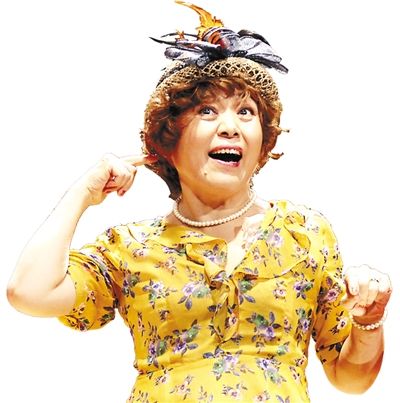Irish novelist, playwright, and poet Samuel Beckett’s drama “Happy Days” is one of his many stage plays that embraces the Theater of the Absurd. The genre argues that a man's quest for meaning and truth in life is futile. The play has been adapted numerous times and in different languages. Now a Chinese version is being presented by the National Theater of China at the Pioneer Theater in downtown Beijing.

Feng Xianzhen
The two-act play follows the daily routine of a character named Winnie, who is buried from the waist down in a low mound. She prattles to her husband Willie, a man who barely speaks. Most of the time Winnie is mumbling to herself, incessantly. Nobody knows why Winnie is buried this way. Playwright Samuel Beckett does not offer an explanation.
But it seems as though Winnie could not care less about it. She lives a “happy” life, passing time between “the bell for waking and the bell for sleep,” and arranging her personal items methodically. A comb, a toothbrush, toothpaste—whatever is in her bag, seemingly, her only possessions.
Beckett’s works often test the patience of his audience, as they might get lost in his oblique references of lines and his style of strangeness. But the cast and crew are trying their best to make the show resonate with theater-goers.
Before the show, the cast and crew put on a literary appreciation session for avid drama fans. Lead actress Feng Xianzhen, who plays Winnie, explains how she digests Beckett’s stream of endless lines, and makes them her own.
“It’s quite a challenging task for an actress in her 60s to remember all the lines, because you have no on-stage opponent and thus no communication. It’s all soliloquy. And you can’t just recite every word like you recite a textbook,” Zou said.
“You need to fully understand it. When it comes to the later stage of rehearsing, I started to think of adding some local opera arias into my character’s lines, like when Winnie sings, and also some dialects like the Shanghai dialect and the Shandong dialect to make the show more accessible to the audience,” she said.
Zou Shuang is the director and translator of Beckett’s “Happy Days.” She has conducted interviews in the UK with people closely associated with Beckett and prominent figures in the theatrical art circle who are deeply influenced by Beckett. Zou says that when she was translating, she tried to not break the rhythm and the rules that Beckett already set in his frame of work.
“The piece is highly poetic. Beckett is a poet. He seemingly wrote nonsense, but again it's working on a very poetic level. The whole thing without poetry would be a very crude translation,” Zou said.
“So I try to add that level of poetic quality into it. Therefore I ask her [Feng] to say something she’s comfortable with, and then I try to interpret why she would feel comfortable about what she just said within the same meaning. And then I come back to my text, and try different versions. And then I will tweak it around to try to find back the poetic quality through the colloquial expression of today in China.”
Beckett is widely regarded as one of the most influential writers of the 20th century. Some of his more notable works include “Waiting For Godot” and “Endgame.”
The Chinese version “Happy Days” will run at the Pioneer Theater in Beijing until Saturday.















